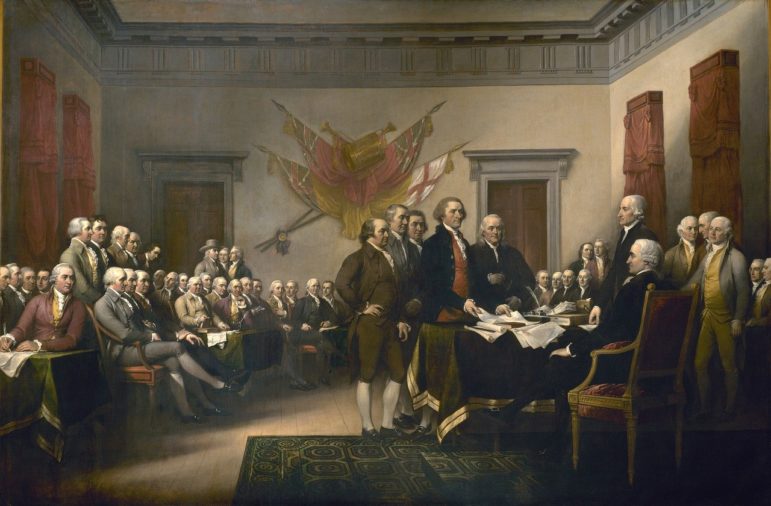
Amidst the fireworks and barbecues lies the memory that the Fourth of July is a time to commemorate the freedom of one of the greatest nations on Earth. The United States of America, built on what we call a democracy, but more accurately a Federal presidential republic, contains so much wealth in its vast lands, its kaleidoscope population, and its knowledge base that its good fortune is often taken for granted.
From July 2nd, 1776 – the day the Continental Congress actually voted for independence – to the ratification of the Declaration of Independence on the 4th, and further into the Revolutionary War and the shaping of the Constitution, the country has come to be defined by its separation of powers controlled by a strong central government to protect the rights of citizens. It is the model of a richly blessed country.
For decades, like many Americans, I grew up believing that this country would forever continue to expand the numbers of people entitled to the full privileges of citizenship, as it seemed to throughout the 20th century. While the nation often took a step back for every two steps it took forward, the overall movement progressed toward increasing equality and acceptance.

Fireworks [Pixabay]
But in reality, I am only three or four generations removed from legal slavery for those visibly or declared Black. I am only two generations removed from women receiving the right to vote. I am barely one generation removed from the eager embrace of Jim Crow laws that permeated life in the southern United States and continue to affect us in the present, such as the legacy of redlining, which limited the social and economic benefits of the New Deal for Blacks and other minority populations.
During my lifetime, there have been advances in civil rights: equal housing, legal status for queer relationships, disabled rights, interracial marriage, reproductive freedom, and even rights for trans and nonbinary individuals to live authentically. Since the mid-twentieth century, the United States of America has championed the embrace of the “I”, the fulfillment of the individual to do, be, and live as desired.
How many nations on the planet Earth have modeled their own governments and constitutions after our beloved Declaration of Independence and US Constitution? How many people have taken the words on the Statue of Liberty to heart as a reason to leave their own lands to embrace a new and unfamiliar culture? How many speak, work, argue, and have the courage to live fully here because of the promises given in the Constitution? The answer is many.
However, we forget that for all of that freedom there is a grim reality: what has been taken for granted can be so easily taken away.
The erosion of our freedoms has begun.

The Declaration of Independence by John Trumbull, 1818 [public domain]
Recent United States Supreme Court decisions, and in particular the most recent decision regarding presidential immunity, hearkens back to the power held by King George III when we divorced ourselves from England.
Remember the Boston Tea Party? We learn of it in school as children. We see it as some historical remnant that happened a few years before the revolution. Now, look back upon it as adults. What was it really protesting? Taxes. In truth, the saying “no taxation without representation” was an 18th century method of calling for the government we aspired to create in the late 1700s to be a rejection of monarchy, a rejection of dictatorship, a rejection of authoritarianism. After all, why pay if we had no say in our own governance?
Now, were women, Blacks, Native Americans, indentured servants, or those who were not landed white men included this vision of democracy? Not right away. It took more than a century past the end of the Civil War, and in truth, this process is still ongoing.
A quick look at the timeline for how these individuals and others demonstrate how the freedom to embrace the “I” took time. For those living in the Southern United States, the phrase “the South Will Rise Again” is still very familiar.
Although the Civil War occurred 163 years ago, its effects and underlying turbulence continue to have ramifications today. While the role of slavery is considered at the heart of why the American Civil War began, consider how cultural acceptance or lack thereof had a clear influence on why the tiny cracks developed into crevasse-sized fissures that ruptured to a point of no return.
The Missouri Compromise of 1820, with the inclusion of alternate free and slave state entrance to the union, meant that every instance of freedom in one part of the country had to be matched by bondage in another. The emergence of the “I” meant that the enslaved person born in Mississippi would be a free person if born in Maine.
Yet this compromise only delayed the eventual war between the states. To this day there are conflicting names for the Civil War that are used depending on one’s point of view.
We are again nearing a point of no return; however, the issue is not the active possession and enslavement of other humans, but the reality that our differences have turned into wounds that can no longer be bandaged and easily overlooked.
A society that preaches equality and acceptance of difference cannot return to its prior incarnations of domination and hierarchy without demolishing what made the country great in the first place.
A country that fights for the rights of other countries to gain freedom or to remain independent cannot do less for its own people without returning to a state of emotional and spiritual enslavement that will destroy the essence of the United States of America.
Our motto, “E Pluribus Unum” is a Latin phrase meaning “from many – one.” It has been our first unofficial motto, long before the 1956 act that made “In God We Trust” as an official motto. As a non-Christian from a Christian family of origin, I cherish that phrase because it emphasizes the very foundation of these United States:
We are from many backgrounds.
We are from many cultures.
We are from many religions.
A kaleidoscope of butterflies is breathtaking to watch in the sky. In many ways, the beauty and strength of the United States lies in the kaleidoscope of its inhabitants.

A cluster of butterflies [ John Carrel, Flickr, CC 2.0]
What makes us stronger is the recognition that each one brings a piece of the puzzle. What makes us weaker is the current stated desire to return to a state of insularity, a repetitive trait that sets in when we as a nation forget the strength of our people through variety, not homogeneity.
Our 25th president, William McKinley, facilitated the Treaty of Paris which ended the Spanish-American war and gave the United States dominion over the territories of Puerto Rico, Guam, the Philippines and Cuba. More importantly was a set of Supreme Court decisions in 1901, called the Insular Cases that decided the status of inhabitants of those territories. Because these were unincorporated territories, while these residents might be technically United States citizens, they did not have the same rights as those residents of incorporated territories.
While the term “insular” can refer to an island, another meaning addresses being narrow-minded or unwilling to consider something or those outside of one’s preferred frame of reference. In a land with an increasingly kaleidoscopic population, insularity is dangerous as it destroys the foundational qualities of the country.
At the time of these court cases in 1901, five of the current states (Oklahoma, New Mexico, Arizona, Alaska, and Hawaii) had not yet been admitted to the union, but they were incorporated territories, which gave individuals living in these spaces more rights than the “citizens” of spaces like Puerto Rico and Guam. Sadly, this distinction remains and is still argued in the legal academy today. (And in one American territory, American Samoa, the inhabitants are not even granted citizenship.)
While it would not be the first time the United States Supreme Court would render decisions considered racist or banning the “I”, this choice exposes the flaws in the premise that the United States is a land for all.
Several recent Supreme Court decisions indicate how a banning of the “I” progresses: Dobbs v. Jackson Women’s Health Organization (Mississippi) in 2022 overturned the former landmark Roe v. Wade (Texas) decision of 1973 that had granted the right to abortion. Ramifications from the Dobbs case include denying the right for women to make decisions regarding their own bodies especially in cases where abortion has been a formerly acceptable option. The immediate impact of this decision included a reversion to individual state laws in effect prior to the 1973 Roe v. Wade ruling.
Horrific stories regarding women fleeing to get medical care in states that permitted abortions have flooded the news during the past two years. The Fourteenth Amendment is a precious tangible link preserving the rights of the “I” that so many of us take for granted, or did prior to the last two years. In 2023, I noted how our precious democracy was like a San Andreas Fault, just waiting for the big one to hit.
The open hint that Supreme Court Justice Clarence Thomas gave in his dissent regarding how decisions that involve the substantive due process clause, as in the Fourteenth Amendment, need to be revisited is now coming to fruition. While an abortion ruling 49 years after the fact was the first, sadly, it won’t be the last. Justice Thomas, a textualist and originalist member of Federalist Society foreshadows in his concurring opinion to the Dobbs decision the growing current state of affairs in his own words:
As I have previously explained, “substantive due process” is an oxymoron that “lack[s] any basis in the Constitution.” Johnson, 576 U. S., at 607–608 (opinion of Thomas, J.); see also, e. g., Vaello Madero, 596 U. S., at 169 (Thomas, J., con- curring) (“[T]ext and history provide little support for mod- ern substantive due process doctrine”). (p.331)
The resolution of this case is thus straightforward. Because the Due Process Clause does not secure any substantive rights, it does not secure a right to abortion. (p. 332)
For that reason, in future cases, we should reconsider all of this Court’s substantive due process precedents, including Griswold, Lawrence, and Obergefell. Because any substan- tive due process decision is “demonstrably erroneous,” Ramos v. Louisiana, 590 U. S. –––, ––– (2020) (Thomas, J., concurring in judgment), we have a duty to “correct the error” established in those precedents, Gamble v. United States, 587 U. S. –––, ––– (2019) (Thomas, J., concurring). (p.332)
Substantive due process conflicts with that textual command and has harmed our country in many ways. Accordingly, we should eliminate it from our jurisprudence at the earliest opportunity. (p.336)
If you live in the United States as a woman, a person of color, or a member of the LGBTQ+ community, these words in 2022 were not only chilling, but a foreshadowing of what was to come. A questioning of basic rights to privacy and other freedoms Americans had come to enjoy, means that living the “I” will become more difficult. Certain religions, including traditions under the Pagan, Heathen, and polytheist umbrellas, are more suspect.
While the United States of America might still be considered in some ways the envy of the world, the reality is that the rot has set in.
For those who watched the recent June 27 US Presidential debate, the chilling effect is not that the choice is between two parties, but that the process of “banning the I” is gaining strength. In the past, I have heard many state that our country, our way of life, our means of a government that is not only by the people but also for the people is in danger.
Sadly, this appears to be the case. It is not a case of whether the “I” will be banned, but when.
The current speculation regarding the current 2024 US Presidential Election includes a proposition for the future of our country that should chill those who are not aware. It is called Project 2025, a project by the Heritage Foundation.
This is a potential issue in the 2024 Presidential Election because one of the underlying premises of Project 2025 is that the President has absolute control of the Executive Branch. The idea of one branch government having more power than another goes against the separation of powers principle in the Federalist Papers and in Article Two of the United States Constitution. The recent Supreme Court decision regarding Presidential Immunity can easily be seen as a rendering of the commonly understood phrase “no one is above the law” because now this is no longer the case. There is overlap with the current Republican presidential candidate’s campaign policy called Agenda 47. These are the first steps towards a country that is no longer a harbinger of freedom, but an incubator for authoritarianism and autocracy. It reminds me of the slide other countries have taken with individual “Presidents” who then rule for years or even decades. This is no longer allowing freedom or the “I” to flourish.
We have come too far to let our “I” be banished. We cannot blame others if we sit while our way of life and the “I” that we have sought to affirm is taken away.
Regardless of one’s personal political beliefs, as we celebrate the freedom and independence of our country, let us not forget the responsibility we have as citizens, residents, and lovers of America: if we wish to have a say in how our lives are lived, in how our “I” will continue to flourish in freedom, then we must listen, pay attention, question, and vote.
We are the United States of America.
The Wild Hunt is not responsible for links to external content.
To join a conversation on this post:
Visit our The Wild Hunt subreddit! Point your favorite browser to https://www.reddit.com/r/The_Wild_Hunt_News/, then click “JOIN”. Make sure to click the bell, too, to be notified of new articles posted to our subreddit.